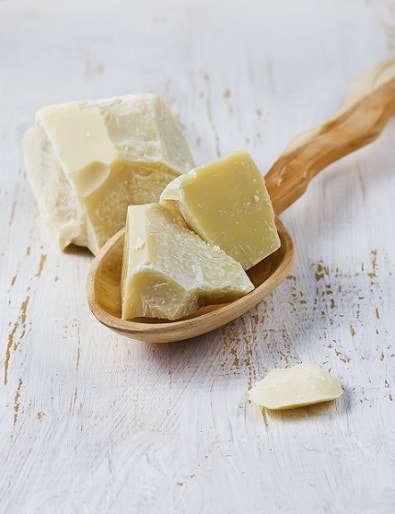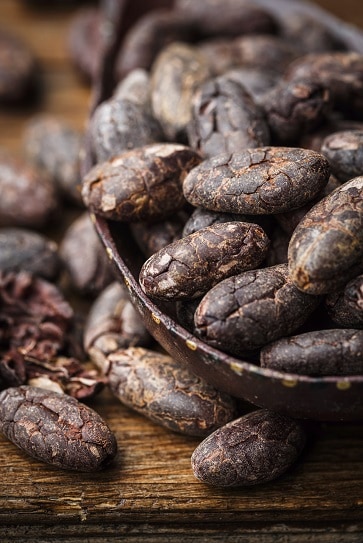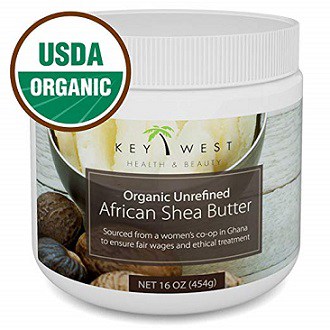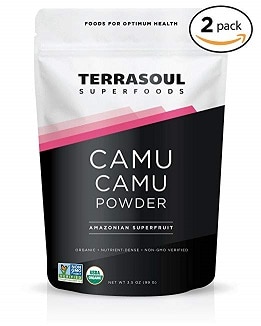 Cocoa butter, also known as oil of theobroma, is widely acknowledged as one of best natural moisturisers around. Many chocolate loving societies like the Aztecs and Mayans used cocoa butter for improving skin tone, as far back as 1000BC.
Cocoa butter, also known as oil of theobroma, is widely acknowledged as one of best natural moisturisers around. Many chocolate loving societies like the Aztecs and Mayans used cocoa butter for improving skin tone, as far back as 1000BC.
Apparently beauty obsessed celebrities in Ghana are recommending cocoa butter left, right and centre, so much so that the whole country is using it. Many women believe that rubbing cocoa butter into their skin can help post pregnancy stretch marks to fade away. Cocoa butter is extensively used by the pharmaceutical industry as an ingredient in creams, topical lotions, cosmetics, and soaps.
Cocoa butter was also widely used as a massage butter in massage parlours from 1828 onwards when a scientist called Coenraad Van Houten invented the “cocoa press”, which allowed him to extract the butter from cocoa beans more economically. Dr Van Houten was actually responsible for the boom in cocoa butter usage across the entire pharmaceutical industry too.
Today women worldwide are tempted by the mildly chocolatey fragrance and pleasant yellow colour. Women everywhere are rubbing cocoa butter into their skin, whether to smoothen their skin or even out its tone.
Cocoa butter clearly contains some hidden powers (although a healthy diet is the real secret to great skin), but is it safe if you’re on a mission to clear your acne?
The most pore-clogging substance on earth?
The answer is no, and I’ll explain why right now. Cocoa butter has a strong tendency to block your skin pores compared to similar natural topical treatments.
Over many decades, the Journal of the American Academy of Dermatology has performed tons of studies on different natural oils, analysing countless physical qualities, whether it be their effects on inflammation and acne, how they affect skin antioxidant supplies, and whether they hydrate the skin or dry it.
The Journal has assembled a massive list of the comedogenic properties of skincare oils. Comedogenicity is a measure of a substance’s ability to clog skin pores, and the Journal has invented 6 ratings. 0 = will not clog your pores. 1 = low chance of clogging your pores. 2= moderately low chance, 3 = moderate chance, 4 = fairly high chance of pores being blocked, and 5 = a very high chance.
Read Annihilate Your Acne – get the greatest diet ever for clear and radiant skin
Cocoa butter was also analysed, and received a rating of 4. Many professional skincare sites warn against using cocoa butter if you’re prone to acne.
Cocoa butter may moisturise your skin, but an analysis of every study the Academy has access to concluded that it clogs your skin pores badly.
Cocoa butter’s comedogenicity is substantially higher than jojoba butter and grapeseed oil, two naturally derived oils which are also beloved for improving human skin tone.
Cocoa butter ranks equally to coconut oil, which receives a rating of 4. As we discussed in this article, coconut oil is highly effective at killing acne bacteria and lowering acne inflammation, but notorious for blocking your pores.
What is cocoa butter?
Cocoa butter is the natural fat sourced from cacao beans. The extracted fat is light yellow in colour and is edible, with a mild chocolatey flavour and scent.
Cocoa butter is the fat portion of most chocolate bars you eat, although cocoa butter prices have skyrocketed recently due to disease plaguing South American cocoa pods. Cocoa companies everywhere are scouring the world for cheap alternatives, whether it be palm oil, argan oil, or camel hump fat.
One area where cocoa butter is still abundant, however, is the pharmaceutical industry. Cocoa butter works well in soaps and cosmetics because its fat profile is mostly saturated; 57-64% saturated, 29-43% monounsaturated, and 0-5% polyunsaturated fat. This blesses the oil with a very high stability and melting point, making it perfect for solid fats in soaps.
Next: the 6 vitamins and minerals which can massively reduce acne
Furthermore, its shelf life is immense – between 2 and 5 years. Because cocoa oil contains plenty of natural antioxidants like vitamin E and cocoa mass polyphenols (assuming that it’s extracted at a cold temperature), cocoa oil takes forever to go rancid. I myself have cocoa butter in my cupboard that’s well over a year old and its fragrance is just as fantastic as ever.
The most important question is whether its reported moisturising powers exist, and the answer is yes.
As we mentioned, Mayans and Aztecs were the original cocoa loving societies (the Mayans even had a chocolate god known as Ek Chuah), and they regularly nourished their skin with the butter as well. There are no studies on cocoa butter’s ability to smooth and hydrate the skin specifically, but 24-37% of cocoa butter’s total fat content is stearic acid (a saturated fat), and a further 24-30% is palmitic acid (which is also saturated).
This study compared two oil-containing skincare creams, called PN and NNSC, to a mixture of oils (PNSC) found naturally in stratum corneum skin cells, including ceramides, cholesterol, and palmitic acid. They found that the mixture containing palmitic acid “was significantly more effective in increasing skin hydration and elasticity” compared to PN and NNSC.
Could palmitic acid be the substance behind cocoa butter’s supposed moisturising powers? There’s nowhere close to enough evidence, but the same study also commented that compounds called ceramides were hydrating, and cocoa butter may contain them as well.
Why bread and pasta are a massive cause of acne
Ceramides are waxy lipids, or fat molecules, which are found in both your hair and different layers of the skin. They’re important for building protein structures in the skin, and help to retain moisture. Increasing ceramides can even help your skin to retain the same quantity of moisture for longer periods.
Finally, higher concentrations of ceramides can protect your cells against UV light damage from the sun, and thus keep your skin in an irritation and burn-free protective bubble. Building an armour against free radicals from sunlight is vital for clearing acne, because you need some sun exposure to make vitamin D. Sensitive, dry and irritated skin has been proven to lack ceramides.
If cocoa butter did contain ceramides, it wouldn’t be surprising that it made your skin resilient and smooth. According to unverified sources on the internet, cocoa butter contains these waxy lipids at concentrations of approximately 3%.
Cocoa butter also contains antioxidants, vitamin E, and currently unidentified plant compounds responsible for the intoxicating aroma. Dark chocolate is noted for its outstanding benefits, such as improving blood flow to the brain, lowering LDL cholesterol, and its antioxidants. The majority of those benefits come from the cocoa powder, but cocoa butter still contains enough substances that applying it to your skin directly might work wonders for tone and hydration.
The 7 greatest topical treatments for naturally clear skin
Elsewhere, there are simply too many positive stories on the acne-sphere to ignore. I can’t speak for the smoothness, but I can testify that most pictures show a general improvement in skin tone, from mildly blotchy and grey to golden and bright.
How it all goes wrong
 It’s unfortunate then, that these powers should NOT tempt you if you are prone to acne. The high comedogenicity rating of 4 is borne out in the real world by user comments:
It’s unfortunate then, that these powers should NOT tempt you if you are prone to acne. The high comedogenicity rating of 4 is borne out in the real world by user comments:
- “MAN did it break me out with acne! Stay away from cocoa butter!”
- “Definitely clogged up my pores”.
- One patient’s acne “got worse after one week” and her skin got “very oily”.
- Finally, one acne patient claimed that they can’t even touch cocoa butter with their hands without unconsciously touching their face and noticing a big acne breakout later in the day. That sounds like a classic overactive imagination to me, but you never know.
The stories are hardly in nightmare territory, but its acne nevertheless. Clearly the American Academy of Dermatology is absolutely correct, in this instance at least…
…but with that said there are also many people claiming that cocoa butter improved their acne, in spite of it being comedogenic. Some acne patients claim they use it for weeks and notice nothing; you’d expert pores to be thoroughly clogged by then. How can this be? There are two compounds which could explain it…
Antioxidants – most of the antioxidants in chocolate come from cocoa powder, but cocoa butter contains one called cocoa mass polyphenol, which in one study was linked to lower production of an inflammatory chemical called immune-globin IgE. Chronic inflammation is the number one cause of acne.
Additionally, cocoa mass polyphenol is known to work wonders in patients with dermatosis and rashes, which are both caused by inflammation.
Vitamin E – the single most important vitamin for acne, since it is your body’s master fat soluble antioxidant that prevents the oil on your face from reacting with free radicals and producing a deadly comedogenic compound called squalene peroxide. Vitamin E can also directly inhibit acne inflammation in your skin cells.
Important knowledge – why common vegetable oils are pure evil for acne
Furthermore, it’s possible that many of the acne patients already had oily skin, and hence, adding a little cocoa butter made no difference to their already thoroughly blocked pores. They might have enjoyed the extra vitamin E and acne antioxidants with no effects.
It’s also possible that their pores did get blocked, but that they were especially deficient in vitamin E and this was sufficient to counter the improved environment for p.acnes bacteria to breed.
Everybody’s circumstances and genetics are different, so cocoa butter will never cause acne in everybody…
…but it is still able to clog pores in the majority of people with acne.
Is cocoa butter an acne-friendly moisturiser?
Cocoa butter is a potent moisturiser and skin hydrator; it’s well accepted in the pharmaceutical industry where they have the eyesight of a hawk for the most effective ingredients. Even though cocoa butter prices shot up by 65% from March 2013 to March 2014, companies are still putting it in their soaps; it’s that effective.
Cocoa butter is good for many aspects of skin health, but it’s definitely not good for clearing acne. Your skin might survive but you don’t want to be deliberately clogging your pores, not when half of your diet is tailored for lowering sebum production.
Your efforts to lower carbohydrates will be made pointless. Your efforts to eat more vitamin A, which is the greatest nutrient for oily skin ever, will also be made pointless. Cocoa butter is terrific if you’re not an acne patient but a serious villain if you are.
Vitamin D – the greatest nutrient for a bright and glowing skin tone
Additionally, there’s a chance that cold processed (raw) cocoa butter might be healthier. Heating cocoa butter can warp the acne-friendly vitamin E and obliterate the delicate antioxidants and there’s also evidence in scientific literature elsewhere that when you heat any oil, it becomes far more potent at blocking pores.
There’s no indication on the Journal of the Academy of American Dermatology as to whether it was raw or heated cocoa butter they tested. What does that mean? The truth is currently shrouded in mystery, but it means that the raw version could be a lot safer for your acne.
If you want to find out then you could try comparing the two for acne, perhaps on different areas of your skin simultaneously. Note that the vast majority of cocoa butter sold in the shops and the vast majority found in chocolate (which is actually an excellent food for acne) is heated.
Shea butter – a vastly superior moisturiser for acne
Shea butter is used for very similar purposes as cocoa butter – for hydration, for improved skin tone, and for dealing with acne scars. It has a similarly storied history; Egyptian historical records from as far back as Cleopatra’s era speak of caravans arriving, packed with clay jars of shea butter for cosmetic usage. Its fat profile is similar enough to cocoa butter that the chocolate industry occasionally uses it as a substitute…
is used for very similar purposes as cocoa butter – for hydration, for improved skin tone, and for dealing with acne scars. It has a similarly storied history; Egyptian historical records from as far back as Cleopatra’s era speak of caravans arriving, packed with clay jars of shea butter for cosmetic usage. Its fat profile is similar enough to cocoa butter that the chocolate industry occasionally uses it as a substitute…
…but there’s one significant difference: shea butter is far less likely to block your pores and hence create acne. While cocoa butter scores a high 4 on the comedogenic scale, shea butter scores 0 (which indicates a very low chance of it blocking pores). Likewise, there are fewer user reports on the internet about clogged pores and acne.
I would never use shea butter myself except in specific circumstances like after swimming in a pool, as I’ve found other ways to keep my skin smooth and strong (see below), but if you do want a topical moisturiser that’s natural and free of chemical contaminants then shea butter is an excellent acne friendly option.
A natural and non-fraudulent (that’s often a problem with shea butter) product is this Sky Organics Shea Butter.
I also strongly recommend that you avoid hot showers. Many acne patients like to inundate their bodies with hot water to scrub all the oil off, and theoretically unblock their pores.
Green tea – proven to reduce acne by up to 51% after 8 weeks
However, this strategy backfires badly for acne. Because sebum is necessary for health purposes like keeping your defensive acid-mantle intact and delivering nutrients, your sebaceous glands respond to the lack of it by becoming hyperactive. They begin churning out far more oil than they would otherwise.
Hot water actually increases your sebum production, and at the same time, it irritates your acne and dries your skin out badly. Simply stop using hot water and you’ll notice a massive reduction in the flakiness on your skin (and in acne).
As you can read in this article, I achieved a miraculous reduction in acne across my entire body just by taking two cold showers per day. My skin tone also became glowing and radiant. It’s a dead easy trick to use for almost all acne patients.
A couple of other excellent natural moisturisers are 1) grapeseed oil, which is dripping with vitamin E and 2) jojoba oil, which is all-round safe and effective.
My personal secret for making moisturisers unnecessary
 There’s a little known secret which is that you don’t need moisturisers at all if you’ve got the nutritional knowledge. I used to use pharmaceutical moisturisers with standard ingredients every morning. I used to believe that if I didn’t, I’d get a leathery and weathered-looking face like a guy who’d been living high in the mountains for 50 years.
There’s a little known secret which is that you don’t need moisturisers at all if you’ve got the nutritional knowledge. I used to use pharmaceutical moisturisers with standard ingredients every morning. I used to believe that if I didn’t, I’d get a leathery and weathered-looking face like a guy who’d been living high in the mountains for 50 years.
The problem was that moisturisers broke me out with acne worse than anything. Every single time I rubbed in a moisturiser my existing acne grew monstrously red and inflamed.
In retrospect it was clearly due to harsh chemicals like dioxane and propylene glycol. Moisturisers and other cosmetics like perfume and make-up are full of acne-causing chemicals.
I stopped using moisturisers for many years but over the last 12 months, I’ve begun taking this Terrasoul Superfoods Raw Camu Camu Powder (amazon link).
I’ve effectively been megadosing vitamin C because the Camu Camu berry (hailing from Peru) is the most concentrated source in the world. I originally took it to heal a nagging foot injury and it did that well. But I also noticed effects on my skin: 1) my acne started healing a lot faster, and 2) my face became as smooth as a baby’s. It wasn’t even something I was aiming for but nevertheless, Camu Camu powder eliminated all roughness and flakiness full-stop.
The vitamin C was responsible but why? Vitamin C is a cofactor required for the production of collagen. That’s your skin’s most important structural protein. It helps old pimples to heal and makes your skin generally stronger, tighter, and more hydrated. Collagen levels slowly drop after age 25 and that’s one of the biggest causes of aging.
If you want smoother skin without wasting time on cocoa butter or creams or oils every morning, then taking Terrasoul Superfoods Raw Camu Camu Powder (amazon link) is a seriously smart idea.
Conclusion
It’s a good strategy to conduct experiments in all areas of acne to determine how your unique body reacts, so you can try cocoa butter if you want to. However, cocoa butter’s propensity to clog pores is just too high to recommend it for acne patients.
If you want to get hydrated and smooth skin then first begin by following my strategies above, or use shea butter if you want faster results. Grapeseed oil and jojoba oil are also effective moisturisers. If you want a unique and natural acne cleanser then try raw honey, tea tree oil, or royal jelly.
If I had a large stockpile of cocoa butter then what I’d do instead is melt it all down and make some homemade dark chocolate with it. If you don’t have a sensitivity, then high cocoa dark chocolate is a fantastic food for acne; it can lower acne inflammation, improve your skin’s resistance to acne from sunlight and give you lots of magnesium. That can all wind up helping your skin without blocking your pores like topical cocoa butter.
This Organic Cocoa Butter By Sky Organics (amazon link) is an excellent, raw brand, to enjoy the taste in its unadulterated form. Just never fall into a trance and smother it onto your face!
Note that one power cocoa butter does have is removing old acne scars. Removal of old acne marks within weeks and making the surrounding skin glowing and healthy is perhaps the most common internet testimonial I’ve seen on acne forums. It’s almost effective against acne scars as aloe vera gel.
If you’ve already followed the acne-clearing advice on this website and unclogged your pores, or if you ever succeed in the future, then cocoa butter might help your skin to become truly clear much faster.
NEXT: the ultimate diet for clearing acne permanently
Thanks for reading!
Wow! What a load of useful, helpful information! My older sister is suddenly breaking out in acne and I’m looking for ways to help heal her. Thank you so much!!
♡☆.
u are so right about not taking hot showers and ill take it a step further: WATER itself is drying just like hot water! i dont even bathe regularly, only the important parts, i dont even wash my face w/ straight water whether cold or hot. i use an oatmeal scrub or rice water or i clean my face w/ oil, no water, its not that necessary, or maybe u can use a cold cream, but a handmade one from etsy, not the ones sold in stores full of drying chemicals.
i have found that dryness is a huge cause of acne(also wrinkles) NOT oily skin! we have all been brainwashed to think acne-sufferers have “oily” skin and it may be so for some people but like this article said, if u take oil away then ur body has to produce more or tries to. truth is that most acne sufferers have dry and dehydrated skin that is irritated and that causes acne. when ur body has enough oil and is balanced, its smooth and acne free, its not inflamed. also dry skin causes wrinkles and large pores, dry dehydrated skin which is why hydrating it and not using over-the-counter acne products that will dry it out even more and also disrupt the acid mantle is much better. also i have noticed that when the air is humid my skin feels much better than when the air is dry so keep that in mind. sorry to rant!
for any severe acne sufferers try the “caveman regimen” for a few months